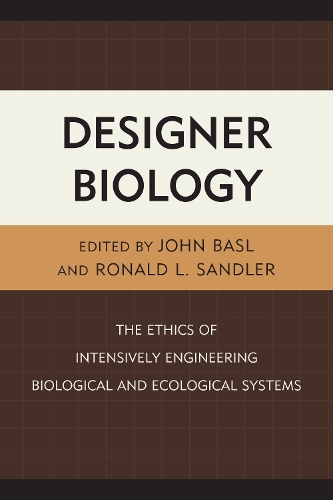
Designer Biology: The Ethics of Intensively Engineering Biological and Ecological Systems
(Paperback)
Publishing Details
Designer Biology: The Ethics of Intensively Engineering Biological and Ecological Systems
By (Author) Ronald L. Sandler
Edited by John Basl
Contributions by Immaculada de Melo Martin
Contributions by Valentina Urbanek
Contributions by David A. Frank
Contributions by William Kabasenche
Contributions by Nicholas Agar
Contributions by S. Matthew Liao
Contributions by Anders Sandberg
Contributions by Rebecca Roache
Bloomsbury Publishing PLC
Lexington Books
24th August 2015
United States
Classifications
Professional and Scholarly
Non Fiction
Social and political philosophy
179.1
Physical Properties
Paperback
304
Width 154mm, Height 228mm, Spine 22mm
467g
Description
Advances in our scientific understanding and technological power in recent decades have dramatically amplified our capacity to intentionally manipulate complex ecological and biological systems. An implication of this is that biological and ecological problems are increasingly understood and approached from an engineering perspective. In environmental contexts, this is exemplified in the pursuits of geoengineering, designer ecosystems, and conservation cloning. In human health contexts, it is exemplified in the development of synthetic biology, bionanotechnology, and human enhancement technologies. Designer Biology: The Ethics of Intensively Engineering Biological and Ecological Systems consists of thirteen chapters (twelve of them original to the collection) that address the ethical issues raised by technological intervention and design across a broad range of biological and ecological systems. Among the technologies addressed are geoengineering, human enhancement, sex selection, genetic modification, and synthetic biology. This collection advances and enriches our understanding of the ethical issues raised by these technologies and identifies general lessons about the ethics of engineering complex biological and ecological systems that can be applied as new technologies and practices emerge. The insights that emerge will be especially valuable to students and scholars of environmental ethics, bioethics, or technology ethics.
Reviews
Humans have always been engineering animals, as Ronald L. Sandler and John Basl remind us in their introduction. But the degree to which this single species can now intensively transform itself, the global ecology, and other life forms means that today we stand on the cusp of something truly startling. In attempting to integrate discussion of what is at stake ethically at some of these frontiers, the chapters in this collection both agitate and entice. At times wildly provocative and combative, at other times gently reassuring and humanistic, these well-written contributions show how the boundaries between ethics, management, and policy are quickly blurring, and how deeply held cultural meanings are starting to shift. Designer Biology deals with topics in both daily news and in cutting-edge academic journals. Read this collection to get educated in the ethics of a fast-evolving technosphere. -- Christopher J. Preston, Professor of Philosophy and Fellow at the Program on Ethics and Public Affairs, University of Montana
Designer Biology is notable both for the breadth of issues that are addressed and for sharpness of the argumentation. I think it will help to focus the discourse on ethical issues connected with some of the key developments in biology and their relevance to a host of possible technological applications. -- Paul B. Thompson, Michigan State University, W.K. Kellogg Professor of Agricultural, Food, and Community Ethics
This work, edited by Basl and Sandler (both, philosophy, Northeastern Univ.), is a compilation of papers based on a workshop held at Northeastern. The book contains 13 chapters divided in three parts: 'Engineering Humans,' 'Engineering the Environment,' and 'Engineering Life.' Twelve of the 13 chapters are from the workshop; the last chapter does a very nice job of providing conclusions and generalizations based on the other chapters. Contributors address topics such as the consideration of moral responsibility for using engineering methods to select the sex of human embryos; using molecular techniques to create 'designer' children; using implants and/or drugs to affect moral behavior; altering the Earth's atmosphere to combat climate change; and artificially designing and developing technologically created organisms. Each chapter stands alone and would pique a reader's interest in moral issues associated with new and future use of biological engineering to manipulate biological entities. The chapters are provocative and are valuable as a basis for considerations of the ethics of human intervention into natural systems. Summing Up: Highly recommended. Upper-division undergraduates, graduate students, and researchers/faculty. * CHOICE *
Author Bio
John Basl is assistant professor of philosophy at Northeastern University and cofounder of Philosophy TV (http://philostv.com). Ronald L. Sandler is associate professor of philosophy at Northeastern University, and also director of Northeasterns Ethics Institute. He is author of The Ethics of Species, Character and Environment, and Nanotechnology: The Social and Ethical Issues, as well as coeditor of Environmental Justice and Environmentalism and Environmental Virtue Ethics.
